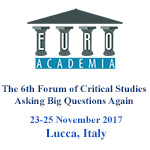Euroacademia Conferences
 Europe Inside-Out: Europe and Europeanness Exposed to Plural Observers (9th Edition) April 24 - 25, 2020
Europe Inside-Out: Europe and Europeanness Exposed to Plural Observers (9th Edition) April 24 - 25, 2020 Identities and Identifications: Politicized Uses of Collective Identities (9th Edition) June 12 - 13, 2020
Identities and Identifications: Politicized Uses of Collective Identities (9th Edition) June 12 - 13, 2020 8th Forum of Critical Studies: Asking Big Questions Again January 24 - 25, 2020
8th Forum of Critical Studies: Asking Big Questions Again January 24 - 25, 2020 Re-Inventing Eastern Europe (7th Edition) December 13 - 14, 2019
Re-Inventing Eastern Europe (7th Edition) December 13 - 14, 2019 The European Union and the Politicization of Europe (8th Edition) October 25 - 26, 2019
The European Union and the Politicization of Europe (8th Edition) October 25 - 26, 2019 Identities and Identifications: Politicized Uses of Collective Identities (8th Edition) June 28 - 29, 2019
Identities and Identifications: Politicized Uses of Collective Identities (8th Edition) June 28 - 29, 2019 The European Union and the Politicization of Europe (7th Edition) January 25 - 26, 2019
The European Union and the Politicization of Europe (7th Edition) January 25 - 26, 2019 7th Forum of Critical Studies: Asking Big Questions Again November 23 - 24, 2018
7th Forum of Critical Studies: Asking Big Questions Again November 23 - 24, 2018 Europe Inside-Out: Europe and Europeanness Exposed to Plural Observers (8th Edition) September 28 - 30, 2018
Europe Inside-Out: Europe and Europeanness Exposed to Plural Observers (8th Edition) September 28 - 30, 2018 Identities and Identifications: Politicized Uses of Collective Identities (7th Edition) June 14 - 15, 2018
Identities and Identifications: Politicized Uses of Collective Identities (7th Edition) June 14 - 15, 2018
Post-Truth, Relativism and Music
-
-

-
Presentation speakers
- Wolfgang Marx, University College Dublin, Ireland
Abstract:
It has become common to “blame” postmodernism and post-structuralism for our new age of post-truth, alternative facts and relativism. Expertise now appears to be discredited, gut feeling at least as important as facts, and facts themselves no longer valid and reliable. But how did we really get to this point? This early-stage research project pursues the hypothesis that this development has actually been much longer in the making, for at least since the late nineteenth century the focus of academic attention shifted more and more from the observation of the world around us (“realism”) to the way in which our societal and individual predispositions, our unconscious, and our emotions influence how we perceive and interpret facts. Stations along this way include Nietzsche’s emphasis of the Dionysian alongside the Apollonian, Freud’s “discovery” of the unconscious, critical theory’s claim that works of art are inevitably shaped by the societal structures of their times (even if they dialectically resist them), Popper and Kuhn’s thoughts on falsification and paradigm shifts in the sciences, the post-structural deconstruction of the use of language by elites to preserve their influence, and postmodernism’s “anything goes”. All of this is now enhanced by the internet’s multiplication of voices which drowns expert knowledge, establishes much larger and almost hermetically sealed filter bubbles and regularly lowers the standard of discourse to vulgar online shouting matches even between educated people. Recent pushbacks against these tendencies include Maurizio Ferrari’s calls for a “new realism” or new enlightenment as well as neuro-scientific findings regarding our processing of information and the interaction of perception and emotion. All of these developments can be exemplified by operas composed at the time of the respective intellectual concept’s emergence. Through the developments outlined above academia has (inadvertently) helped paving the way for relativism and post-truth attitudes in the public sphere – therefore it is up to academics to help tackling this problem. As a contribution to this task I will shortly start teaching a module along these lines at my university.
-
Related Presentations

Not So Ordoliberal after All? Public Management and the Transformation of European Governance
- Ian Alexander Lovering

Intervention - Working the Body
- Isabel Fontbona Mola

A (Really) Big Question: Which Is The Proper Political Subject?
- Carles José i Mestre

New Frontiers in Indigenous Economies: The Example of the United States
- Susanne Berthier Foglar













